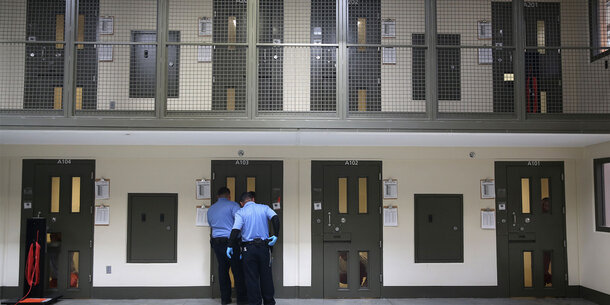Today Senator Cory Booker (D-NJ) and Representative Tony Cárdenas (D-Calif.) introduced the Smart Sentencing Adjustments Act in the U.S. Senate and House of Representatives. The bill would provide federal funding as an incentive to state governments to reduce incarceration while reducing crime. State prisons hold 87% of the nation’s prison population.
“Federal funding has driven mass incarceration for decades, and the Smart Sentencing Adjustments Act would do the opposite: incentivize states to reduce both incarceration and crime,” said Lauren-Brooke Eisen, senior director of the Justice Program at the Brennan Center for Justice at NYU Law. “This bill is a must in 2023, when mass incarceration is still devastating the lives of so many Americans, particularly Black and Latino people.”
Brennan Center research shows that 40% of the people in state and federal prisons do not pose a risk to public safety. The Smart Sentencing Adjustments Act would provide funding for states to identify and address the sources of unnecessary incarceration in their systems, while investing in ways to lower crime and keep people safe.
The act would create a $2 billion grant program to reward states that shrink their prison populations by 20% over three years. It would offer participating states a wide variety of policies and programs for supporting people who have been in prison so they don’t return, making communities safer, providing alternatives to incarceration, and more.
For the length of the funding period, the bill would prohibit participating states from enacting excessively punitive sentencing legislation, such as mandatory minimums, truth-in-sentencing laws, and habitual offender laws.
“The United States is the world’s number-one incarcerator. For decades, we have needlessly subjected millions of people to overcrowded, violent, and inhumane prisons and jails, then released them with little or no support. The Smart Sentencing Adjustments Act can start to chip away at these excesses of mass incarceration while enhancing public safety,” said Hernandez Stroud, counsel in the Justice Program at the Brennan Center. “Congress should pass it without delay.”
If the 25 states with the largest prison populations met the bill’s 20% goal, 179,000 fewer people would be behind bars – more people than are currently incarcerated in the entire federal prison system.
The Smart Sentencing Adjustments Act is based on a Brennan Center proposal called the Public Safety and Prison Reduction Act, published in March.
The Brennan Center is joined by the following criminal justice experts in endorsing the bill:
Kara Gotsch, Deputy Director, The Sentencing Project: “The United States is responsible for some of the harshest prison sentences in the world, which has contributed to the scourge of mass incarceration and racial injustice. This legislation helps states promote proportionality, fairness, and justice in pursuing public safety.”
Jesselyn McCurdy, Executive Vice President of Government Affairs, the Leadership Conference on Civil and Human Rights: “We cannot incarcerate our way out of the problems we face in our communities, as we’ve seen the racially disproportionate impact mass incarceration has had on our country. The federal government has a unique role to play in helping states decarcerate, and Congress should act swiftly to pass this bill.”
Michael Mendoza, Director of Advocacy, Anti-Recidivism Coalition: “Our current system of reentry consistently fails to meaningfully support our community members returning home from incarceration. By incentivizing states to invest significant resources in evidence-based anti-recidivism strategies, this bill can help transform our system into one that does not respond to deep-rooted community challenges with harmful and ineffective over-incarceration, a vision we at the Anti-Recidivism Coalition advocate for every day.”
Jason Pye, Director of Rule of Law Initiatives of the Due Process Institute: “The Smart Sentencing Adjustments Act is a sensible solution that both Republicans and Democrats can support. This bill would help preserve law enforcement tools that protect public safety, stop the revolving prison door, and give real second chances to people who have been unnecessarily incarcerated and shut out from society. Congress should pass it now.”
Ronald Serpas, Former Police Superintendent of New Orleans, and Executive Director, Law Enforcement Leaders to Reduce Crime & Incarceration: “The lessons from our past criminal justice practices urge us to implement new policies that meet the needs of the twenty-first century and help us reach our goals for safer communities. The Smart Sentencing Adjustments Act can accomplish that by reducing unnecessary incarceration and taking steps to improve public safety. As we work tirelessly to reduce crime, especially violent crime, we must focus our attention on aligning incarceration practices with science and evidence-based solutions.”




